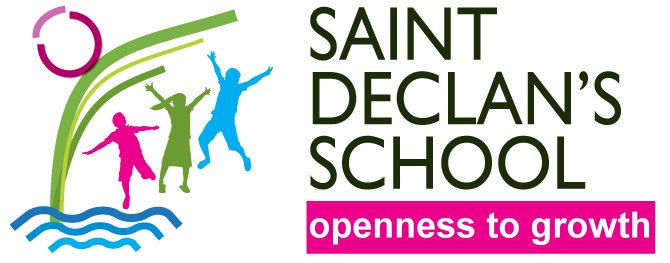Occupational Therapy
Children who are referred to St. Declan’s often have sensory integration, self-regulation and co-ordination difficulties. A child with a sensory integration disorder can show some of the following ways:
-
- Overly sensitive to touch, movement, sight, sound and/or smell.
- Challenges in the areas of coordination and poor organisation for movement.
- Under reaction to sensory stimulation.
- Activity level that is unusually high or unusually low.
- Delays in speech, language, motor skills or academic achievement.
Parents and teachers are concerned that they cannot follow-up on occupational therapy recommendations in the children’s reports. These recommendations can sometimes be addressed effectively through school based occupational therapy programmes. After all the children’s ‘occupation’ is learning and playing with their peers in a school setting.
While a few of the children may be attending individual occupational therapy sessions outside school, St. Declan’s recognises the need for a comprehensive and school-based programme to meet the needs of all the children. There is currently no funding from the Department of Education and Science for such a programme.
However, the board of management, staff and parent’s association have sought to address this issue. Successful fundraising events, organised by the parent’s association, have enabled the board of management to budget for both a whole school assessment of needs and a number of hours of intervention by a qualified occupational therapist. Obviously such an endeavour requires funding on an on-going basis.
{loadposition Blue Room}
Occupational Therapy Report
In 2012 the board of management commissioned a report to “Investigate the Contribution of Occupational Therapy to Support Better Learning at St. Declan’s School”. The report focused on the functional difficulties and strengths of the children in the learning environment.
Having consulted with the principal, teachers and SNAs the following areas were suggested for Occupational Therapy input:
- Classroom ergonomics
- Sensory processing difficulties and concentration
- Handwriting difficulties
- Physical coordination
- How to teach activities of daily living
- Activities that improve joint participation and social skills
Parents were also asked for their priorities regarding occupational therapy. It is interesting to note that the areas parents emphasised where by and large the same as those suggested by the teachers. Parents’ top priorities were:
- Fine motor coordination (pencil grip,typing)
- Daily living skills (dressing, buttons, zips, tooth brushing, combing and brushing hair)
- Social skills/friendship/peer relations
- Transition to mainstream (primary and secondary)
{loadposition Blue Room Balls}
Occupational Therapy Interventions in St. Declan’s
Since 2009 the National Behaviour Support Service (NBSS) Occupational Therapists have worked in partnership with schools, introducing the international evidence-based ALERT programme ‘How Does Your Engine Run’.
The programme aims to help students monitor, maintain and change their level of alertness so that it is appropriate to the situation or task. The programme identifies students’ sensory needs and encourages students to use of sensory motor strategies to support self-regulation, so that their engines are running ‘just right’. www.nbss.ie
In 2013 teachers and SNAs in St. Declan’s were introduced to the Alert programme and had some instruction in class-based interventions. A number of school-wide interventions were put in place arising out of an awareness of the needs of these children relating to sensory integration, self-regulation and coordination issues.
- An occupational therapy soft room (The Blue Room) is now established
- Classes take regular movement breaks in class
- Individual Education Plans (IEPs) now include targets for specific movement breaks for some children
- Children follow adult supervised occupational therapist programmes in the Blue Room
- All children now do morning exercises in the yard at activity stations
- Special Needs Assistants supervise structured games on every yard break
- Children use seating and handwriting aids, stress balls and ‘fidget squishes” where appropriate
- Golden Time is timetabled to involve in children in free-play which promotes peer socialisation
